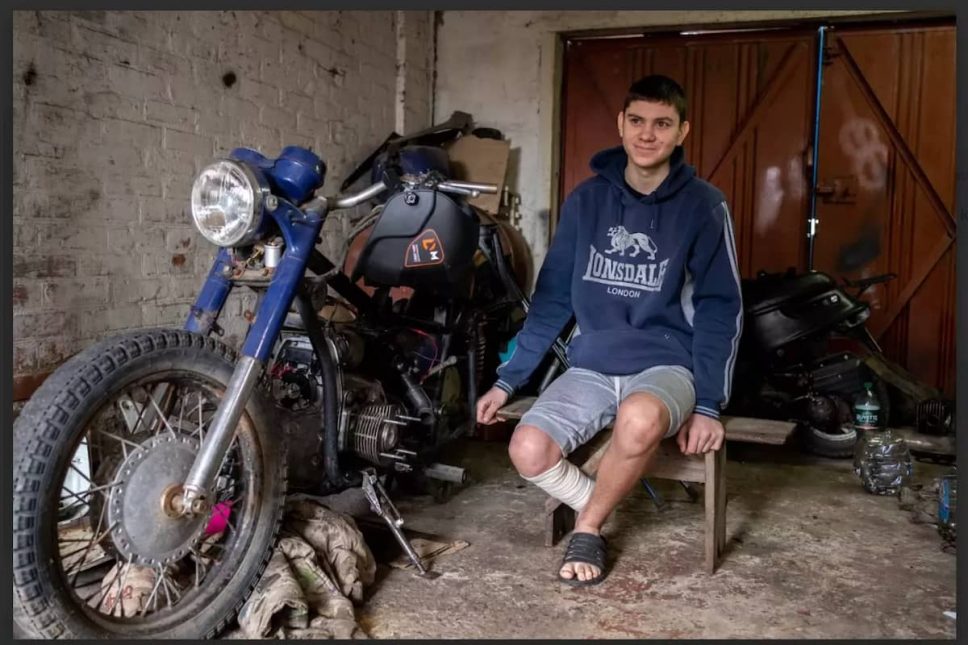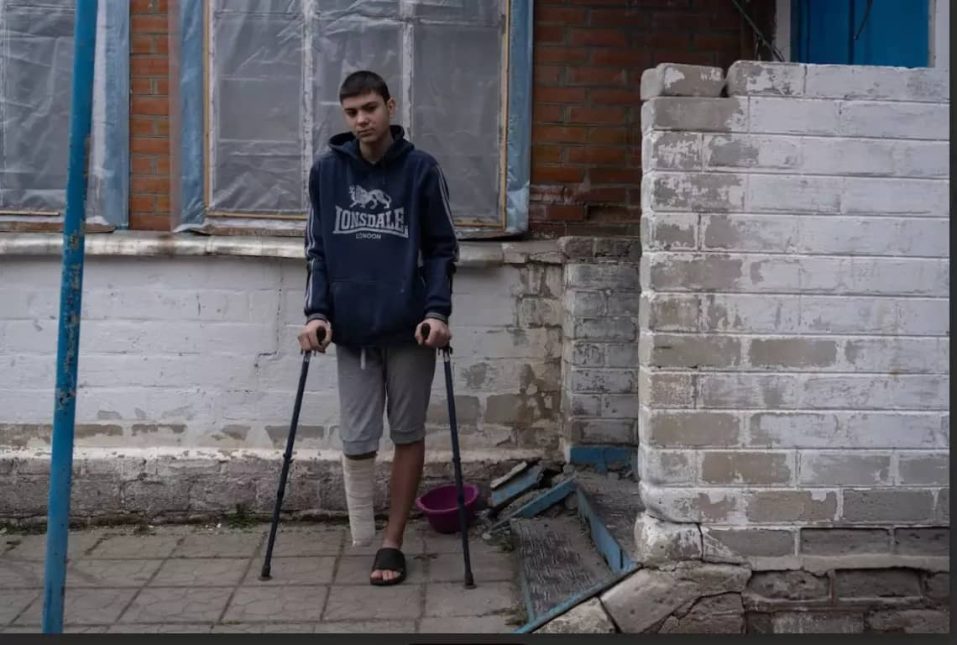
In Kharkiv, 14-year-old boy finds new hope following mine horror
20/09/2024
After years of war, Ukraine is now one of the most mine-contaminated countries in the world. The ongoing fighting has left nearly a third of the country contaminated with landmines and other explosive ordnance, threatening the daily lives of children and families.
Fourteen-year-old Yaroslav, from the Kharkiv region, knows the dangers all too well. In October 2023, his life changed forever when he stepped on a PFM-1 butterfly mine, an anti-personnel weapon that causes horrific injuries. The blast not only severed the lower part of Yaroslav’s right leg, but also left deep emotional scars that will likely stay with him for the rest of his life.
The boy had been running errands on a motorcycle when the chain slipped and he veered off the road. The explosion occurred instantly, causing severe injuries and blowing off part of his lower limb. Fortunately, Yaroslav’s father was one of the first to arrive at the scene and provide his son with immediate first aid. An ambulance arrived within five minutes, and Yaroslav was promptly taken to a hospital in Kharkiv, where he underwent emergency surgery.

The next five months of Yaroslav’s life were gruelling. He was forced to use crutches to move around and had to adapt to the new challenges posed by his injury. However, thanks to the support of national NGOs, Yaroslav has received comprehensive assistance which includes purchasing a high-quality prosthesis from Germany and rehabilitation services in the Lviv region, where Yaroslav is able to live in a supportive environment that aids his physical and emotional healing.
The United Nations Children’s Fund’s (UNICEF) child-focused victim assistance programme, implemented in partnership with the International Rescue Committee (IRC) and supported by the Directorate-General for European Civil Protection and Humanitarian Aid Operations (ECHO), was launched in January 2024 across the Kharkiv, Odesa, Mykolaiv and Kherson regions. The programme offers comprehensive support, including case management, individual psychological counselling, structured psychosocial support, and an emergency case management fund for mine and other explosive ordnance survivors. It also promotes disability inclusion through community engagement activities. As a preventive measure, UNICEF´s and IRC’s implementing partner – the Ukrainian Demining Association (UDA) NGO – conducts Explosive Ordnance Risk Education (EORE) sessions for children, adolescents and teachers to raise awareness about the dangers of landmines and unexploded ordnance. Additionally, the programme aims to strengthen the capacities of social services in providing case management for victims of mine and explosive ordnance accidents, and to enhance the capabilities of local civil society organizations in victim assistance programmes.

Once Yaroslav’s received his prosthesis, the Department of Social Protection of the Kharkiv Regional State Administration and UNICEF referred the case to IRC’s victim assistance programme supported by UNICEF and the European Union’s Directorate-General for Civil Protection and Humanitarian Aid (ECHO). Case workers conducted a needs assessment for Yaroslav and his family to identify their primary needs, and Yaroslav has now started to receive individual counselling sessions from an IRC psychologist to support him in overcoming the trauma he has experienced and to improve his well-being to cope with the challenges and changes he faced as a result of the incident.
As a comprehensive approach, in order to support both Yaroslav and his family with their basic needs, the IRC has provided them with clothes, shoes, and bedding through the emergency case management fund. In addition, IRC case workers have referred the family to other institutions and organizations for financial assistance. During this process, an IRC case worker and a psychologist have continued to visit the family and regularly telephone Yaroslav to monitor his situation closely. Recently, Yaroslav’s family was found to be eligible for the IRC’s cash assistance programme and will start to receive payments for each family member in the upcoming months. The IRC also plans to invite Yaroslav to attend EORE sessions, conducted by the UDA within the victim assistance programme with IRC and UNICEF in order to increase awareness of possible risks and safe behaviour among children and parents, and to reduce the risk of similar incidents in the future.
Yaroslav’s journey is a powerful testament to the impact of collective efforts. After the explosion, the boy faced significant physical and psychological challenges. However, through the child-focused victim assistance programme, Yaroslav has received comprehensive support, including financial assistance, psychological support, referrals for social protection and basic needs support. With the encouragement of his loved ones and collective efforts, Yaroslav has now gradually adapted to his new circumstances. He has returned to his studies and social life, surrounded by supportive friends, and even set a new goal for himself – to become a welder. His determination recently shone through when he assembled a motorcycle from scratch, reigniting his passion for his hobbies and marking a significant milestone in his recovery.
This story exemplifies the strength and resilience of Yaroslav and his family, bolstered by unwavering support from the IRC, UNICEF and the European Union’s Directorate-General for Civil Protection and Humanitarian Aid (ECHO). The holistic approach in the child-focused victim assistance programme ensured that Yaroslav had the resources needed to help rebuild his life. His journey also highlights the critical need for EORE programmes to prevent similar tragedies in highly contaminated contexts. Through our continued efforts, we aim to help Yaroslav and his family achieve their goals, as well as other children and families affected by similar situations.
Stories
-
Katarina Mathernova: If Ukraine had a human face and a human spirit, it would be 10-year-old Roman Oleksiv
-
A regional mission to drive social entrepreneurship: the story of Ksenia Kosukha
-
EU restores safe water supply for 100,000 Ukrainians affected by war
-
Promoting IT during the war: Lviv IT cluster and how EU4Digital helps
-
Frontline digitalisation: Kharkiv IT Cluster collaborations
-
How EU4Youth is driving opportunity and success among young Ukrainians